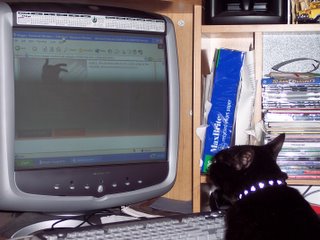Science According to a Cat.
 This past Thursday I read a fascinating article about some sponges that have baffled researchers at the University of Stuttgart. I crossed it in one of my self-proclaimed owner's more read-worthy periodicals, a slim, papery volume, simply titled Awake!, and at first it looked like little more than a curious titbit of trivial interest. Now, however, after several thought-conducive periods of silent meditation, I realise its true value: This article is possibly the best example of how dogmatic conventionalism stifles the depth of actual knowledge held by the scientific community.
This past Thursday I read a fascinating article about some sponges that have baffled researchers at the University of Stuttgart. I crossed it in one of my self-proclaimed owner's more read-worthy periodicals, a slim, papery volume, simply titled Awake!, and at first it looked like little more than a curious titbit of trivial interest. Now, however, after several thought-conducive periods of silent meditation, I realise its true value: This article is possibly the best example of how dogmatic conventionalism stifles the depth of actual knowledge held by the scientific community.I freely admit that I am no scientist. One reason is the mechanical impracticality of holding a glass beaker without the benefit of an opposable thumb; another is an unremitting temptation to taste the lab rats. Keep in mind, however, that such drawbacks of felinity do not hinder logical, coherent thought, but, in fact, foster it. (Possibly not the tasting rats bit, but you wouldn't believe the precise thinking required to put these blogs into a format understandable to the common human.) It is only because of my superior feline reasoning and an inability to develop dogmatic, human-like philosophies that I can confidently suggest faults in the modern scientific method.
The aforementioned article, A Surprising Sponge, delineates several remarkable talents displayed by what is described as a "white, spherical sponge." Listed among these talents is the ability to propel itself several centimetres a day, (which apparently is quite a feat for a small, white, spherical sponge,) the ability to reduce its own body mass up to seventy percent by simply constricting itself at rhythmic intervals, and absorbing nutrients and soluble oxygen when reabsorbing water. As notable as these abilities are, however, the thing that has most baffled the scientific minds of Stuttgart Germany is this sponge's response when small crustaceans are introduced to its environment. Since, technically, it has no nervous system, researchers are plagued with the age-old question, how? How does an organism possessing no brain or nerve receptors control movement or detect the presence of other creatures?
The human solution to this phenomena, and others like it, is to attain funding to do more research, become more baffled, and, finally, in the end, present a thousand different theories, all of which will later be "debunked" by a smarter, wealthier, scientist, who will then win the Nobel Prize for making strides in modern marine biology or some other such rubbish.
The feline solution is much more practical: Attain funding to harvest more test subjects, find a reception hall that offers cooking facilities, and organise a sponge cook-off with as many prominent French chefs as are willing to attend. Think about the puzzling subjects as you pop them into your mouth and wash them down with a choice wine. True, you may not come up with a thousand plausible theories, but upon finishing your feast you will be able to add one hardcore fact to the science texts: Sponges may have many baffling talents, but one they do not possess is the ability to taste good.
Yours Purringly,
W.C. Humphries (Mr. Fleez for short.)
READERS REMEMBER! You may now ask Mr. Fleez for his jaded opinion* on your personal situations. Please send your enquiries to: housecatwisdom@yahoo.co.uk.
*DISCLAIMER: By contacting Housecat Wisdom you're asking a housecat for his personal opinion. If you require serious advice, please, write Ann Landers, Dear Abby, or consult a professional psychiatrist.
akw: Grooming salon, Decorations, Kitty Condo, Cat Tree, Cat Toy, Cat nip, Cat Teaser, Cat Lazer, Cat Treats.

0 Comments:
Post a Comment
Subscribe to Post Comments [Atom]
<< Home